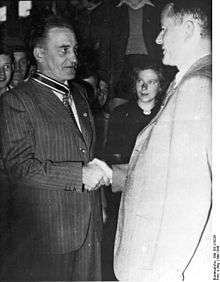Wehrwirtschaftsführer


Wehrwirtschaftsführer (WeWiFü) were, during the time of Nazi Germany (1933–1945), executives of companies or big factories called 'rüstungswichtiger Betrieb' (company important for the production of war materials). Wehrwirtschaftsführer were appointed, starting 1935, by the 'Wehrwirtschafts- und Rüstungsamt' (department for implementing the policy of directing the nation's economic activity towards preparation for and support of the war effort, including armaments) being a part of the Oberkommando der Wehrmacht (OKW), that was pushing the build-up of arms for the Deutsche Wehrmacht. The purpose of the appointment was to bind them to the Wehrmacht and to give them a quasi-military status.
After 1938, the Reich Ministry of Economics appointed the Wehrwirtschaftsführer. From 1940 on, this title was given more and more also to leading employees in companies not belonging to the armament branch, also to demonstrate that those companies were contributing to the wartime economy.
Especially before 1940, appointments did not indicate the political attitude of the person receiving the title. They also gave no information saying that his company / the company he was managing was important for the armament.
If a manager was appointed 'Wehrwirtschaftsführer', his company could more easily use negative employment laws for the workers and employees.
Appointed were (this is no complete list):
- Gustav Böhme, owner of Dr. Ing. Böhme & Co., Metallwarenfabrik, Minden-Lubbecherstrasse. ([1])
- Walter Borbet, chief executive officer and general director of the Bochumer Verein o coal mining company,[2]
- Carl Friedrich Wilhelm Borgward
- William Borm
- Carl Bosch
- Max Brose
- Richard Bruhn (Auto Union)
- Heinrich Bütefisch (I.G. Farben)
- August Diehn (Deutsches Kalisyndikat)
- Carl Martin Dolezalek[3]
- Claude Dornier
- Gerhard Fieseler
- Friedrich Flick
- Edmund Geilenberg
- Ernst Heinkel
- Jost Henkel
- Heinrich Hunke
- Robert Kabelac
- Gustav Köllmann
- Carl Krauch
- Alfried Krupp von Bohlen und Halbach
- Gustav Krupp von Bohlen und Halbach
- Friedrich Linde
- Karl Emanuel Merck[4]
- Wilhelm Emil Messerschmitt
- Johannes Müller
- Heinrich Nordhoff
- Heinrich Notz
- Hans Constantin Paulssen
- Ernst Poensgen
- Ferdinand Porsche
- Günther Quandt
- Wilhelm Renner
- Fritz Reuther
- Waldemar Rienäcker
- Hermann Röchling
- Willy Sachs
- Eduard Schalfejew
- Philipp Alois von Schoeller
- Hans-Günther Sohl
- Franz Stapelfeldt
- Kurt Tank
- Herbert Tengelmann
- Hermann Terberger
- Emil Tscheulin
- Wilhelm Voss
- Ludger Westrick
- Wolf-Dietrich von Witzleben (Siemens)
- Ernst Zindel
References
- ↑ Blanke-Bohne, Reinhold. “Die unterirdische Verlagerung von Rüstungsbetrieben und die Außenlager des KZ Neuengamme in Porta Westfalica bei Minden.” Dissertation, University of Bremen, 1984.
- ↑ Gustav-Hermann Seebold "Ein Stahlkonzern im Dritten Reich – Der Bochumer Verein 1927–1945", Peter Hammer Verlag Wuppertal 1981, p. 242 (German)
- ↑ Manfred Overesch: Bosch in Hildesheim 1937–1945: freies Unternehmertum und nationalsozialistische Rüstungspolitik, Vandenhoeck & Ruprecht, Göttingen 2008, ISBN 978-3-525-36754-4 (German)
- ↑ Ernst Klee: Das Personenlexikon zum Dritten Reich. Wer war was vor und nach 1945. Fischer Taschenbuch Verlag, 2nd aktualisierte Auflage, Frankfurt am Main 2005, ISBN 978-3-596-16048-8, p. 404. (German)
Further reading
- Klaus Drobisch: Dokumente über Vorgeschichte und Charakter des faschistischen Wehrwirtschaftsführer-Korps. In: Zeitschrift für Militärgeschichte 5, 1966, ISSN 0044-3115, S. 323–337.
- Jens Ulrich Heine: Namen und Herkunft der Wehrwirtschaftsführer des Deutschen Reiches am 1. Januar 1942. 1976. (title: Names and background of the Wehrwirtschaftsführer of the German Reich at 1 January 1942)
External links
- Braunbuch: Kriegs- und Naziverbrecher in der Bundesrepublik und in Westberlin. Hrsg. v. Nationalrat der "Nationalen Front des Demokratischen Deutschland" (GDR), 1968. Online via Internet Archive : Liste von Wehrwirtschaftsführern (German)
- Cornelia Rauh-Kühne: „Wehrwirtschaftsführer im NS“ auf H-Soz-u-Kult, 1 July 2002 (German)
- Begriffsbestimmung from the Enzyklopädie des Nationalsozialismus (German)